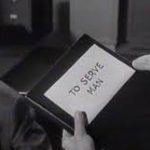The Perils Of Speculative Cooking
 An article on the perils of Romance fiction, Amish stories, Tales of the Bonnet, and other subversive incitements to lust, lasciviousness, and impure imagination caught my eye the other day.
An article on the perils of Romance fiction, Amish stories, Tales of the Bonnet, and other subversive incitements to lust, lasciviousness, and impure imagination caught my eye the other day.
I experienced a thunderbolt of inspiration. Divine inspiration. The author, and the rest of us, have missed the true spiritual threat lurking among the stacks of supposedly “uplifting” reading material that burden the shelves of our supposedly “Christian” bookstores.
Cookbooks. Hundreds of ’em.
You might say that nothing is so natural as food, and a shared meal is the foundation of Christian fellowship and family unity, and I would agree with you. All sin begins with something good, some gift of God that becomes horribly twisted by our fallen desires. The cookbook may begin from an innocent motivation, but it leads inevitably to the destruction of the fellowship and unity that we seek. Here’s how:
1. Cookbooks breed dissatisfaction with traditional home cooking. Suddenly, salt and pepper aren’t good enough. We need exotic spices with unpronounceable names from exotic places with unpronounceable names where people participate in unholy rituals with unpronounceable names. Mom’s meatloaf and fried chicken seem bland and uninteresting by comparison. Family members begin to prowl the urban backalleys late at night seeking the titillation of Pressed Duck, Beef Wellington, or, heaven forbid, Moo Goo Gai Pan.
2. Cookbooks create dissension and jealousy within the Church. Once the cookbook has infiltrated the house of worship, nothing is ever the same again. Grey-haired cornerstones of the congregation totter home from church potlucks in tears, their macaroni & cheese and carrot-jello molds barely touched. Families stop reading the Bible and turn to ever-more-expensive recipe tomes, searching for the perfect dish to silence the boasting of their neighbors across the aisle. Cherry pie is supplanted by Cherries Jubilee.
3. Cookbooks corrupt the mind with lustful images of culinary excess. I mean, just look at this. It’s shameful. Gluttonous. There are worse things out there–dishes prepared from parts of the animal never meant to see the light of day. I’ll spare you that indecency.
4. Cookbooks are cutting into my market share. I have a line of spiritually-uplifting cookery pamphlets that keep food in its proper place and preserve the Christian values of a modest meal, tastefully prepared. They’re available in paperback and e-book from my personal publishing house, FredBooks.com. Here’s a sample:
- Cooking with Jesus: Satisfying Meals from Five Loaves and Two Fishes
- The Prophet Diet: High Protein, Low Carb, Organic Dishes Inspired by John the Baptist
- Manna Rebooted!
- The Sanctified Chicken: Because Game Birds Will Kill You (Numbers 11:31-34)
Now, go forth and eat the way God intended.










































Hey Fred — if we’re thinking about the same article, if, I wonder if perhaps you may have missed the writer’s point? That would be easy to do, though, given his lack of clarity and especially some well-meaning but worse comments that followed!
Here’s a portion of the one I’m thinking about, from Russell Moore. I don’t mind linking to it, because I thought overall the piece was good. Many of the comments, though, were absolutely woeful — particularly the “all fiction is untruth, and Christians shouldn’t read untruth” cliche (yes, apparently it is still around).
So in other words, he’s left an “out” for better-written novels, classified as “romance” right along with the other stuff, that are better-done stories.
I think we can agree those kinds of books are certainly out there. And if you haven’t seen the problems they exacerbate — I could share a few stories! (Of course, people and not Things are still responsible for their own sins, but sometimes Things don’t help.)
So, what this guy was objecting to were not good cookbooks, but (in theory) not-so-good ones — the kind that teach you only how to make fatty foods and desserts and chocolate and cheesecake and consume them without any kind of low-fat or low-calorie balance from vegetables and such.
Yes, I know. I’d be tempted to live according to a cookbook like that. Ha ha!
But isn’t that Moore’s point about “romance”-only novels that offer cheap imitations of real love, apart from the context of real life and realistically portrayed people that actually lead to better and more-Biblical stories?
Then again, you may not have been referring to Moore’s column in the first place.
Regardless, he could have worded things better, and at least anticipated some of the silly “all fiction is a lie and sinful” objection from his Baptist audience (Moore, and many guys at Southern Baptist Theological Seminary, are themselves less vulnerable to those false “doctrine” tropes). I like, for example, Tim George‘s reminder:
And for the Christian, romance only means something not only when it’s set against the backdrop of real life, but when it points to the love Christ has for His Church and the Gospel — the “mystery” to which love and marriage were always pointing, as shown in Ephesians 5 and echoed in Revelation 21.
Thanks for the laugh today. Hard to believe some of the reasons given for the negativity toward Christian fiction.
Stephen, Yes, Mr. Moore’s article was the primary, but not sole, inspiration for this piece. It wasn’t intended as a direct satire, which is why I didn’t link to him, and he’s less strident than most on this topic.
It’s more about an attitude or subtext that keeps popping up. “People really like A. I don’t understand it. A must be somehow evil. Aha! A is pornography!” Pick an item of interest, and you can bet somebody in search of an audience has tacked the suffix ‘porn’ onto it.
Here’s the bit from Mr. Moore that bothered me:
While I don’t share all the presuppositions of these scholars, I think they’re on to something about the allure of the commercialized romance story. Pornography and romance novels aren’t (or at least aren’t always) morally equivalent, but they “work” the same way.
So, romance novels aren’t pornography…except when they are. And the exception he makes, without providing an example, strikes me as ‘damning with faint praise.’ Is there a legitimate danger of people becoming unbalanced and obsessed in this area? Certainly, but he’s painting the genre with a very broad brush.
Both are based on an illusion. Pornography is based on the illusion of a perfectly willing, always aroused partner without the “work” of relational intimacy. Often romance novels or their film equivalents do the same thing for the emotional needs of women that pornography offers for the erotic urges of men.
It’s not hard to extend this position with regard to human relationships as “illusion = pornography,” at which point, we’re all in trouble, because we’ve landed in the “fiction=illusion=sin” bucket that several of his commentators were all too eager to take up.
I think most Christian romance writers aspire to write about loving relationships that mirror the Christ/Church relationship, which is why so many of them who commented were justifiably angry about being spattered by Moore’s voluminous paintbrush. Sure, many of those relationships are idealized, but I think it’s naive to complain about events and relationships in any fictional venue being idealized. Fiction isn’t reality. If it was, it would be non-fiction. And if we can’t portray an ideal in fiction, where can we?
While romance is not my favorite genre, I loved this spoof. Especially because I recently went to a potluck with 10 different salads and almost nothing else. Pick a spiritual application out of that!
Lots of replies to Fred here — I’ll go point-by-point, mostly for clarity.
Called it, then! And I also called the non-Apocalypse-kickoff of May 21. Yes, I am really batting a thousand this week in the prediction playoffs. Send me some money.
My disclaimer: I do believe Moore could have been clearer. And it would have been much better to offer specific examples rather than shooting wild and thus seeming to implicate nearly everyone, as you said. Also, try some positive examples. If not this, for these reasons, then this instead. Moore is a good scholar and very smart about many topics, and is more open to fiction than other “Young Restless Reformed” leader folks (more on that later). But one couldn’t know that from this column; nor, as I said earlier, did he anticipate anti-all-fiction and anti-Biblical wild replies to his basic point.
This is where he needed to cite some anecdotal evidence. I could have helped him; others also could have. I know of cases like this, and have also worked in a Christian bookstore and, sadly, met folks who clearly lived like this. Surely they’re the minority, and Moore should have said so, but still they exist and we ought to address this risk too.
1. Person isn’t happy in her marriage, likely due to no single person’s blame, either hers or his, but more likely shared guilt for both partners failing to imitate Christ and/or His Church (Ephesians 5) and enjoy the challenges and romantic delights of marriage as “Christian hedonists” thanks to their Savior (Song of Solomon).
2. Instead of staying grounded in reality, person turns to pop-Christian romance novels to fill the void — the female WASP equivalent of the stereotypical male basement nerd.
3. Husband looks worse and worse by comparison to hunky heroes in romance novels — hunky heroes who may not get on the front covers or with their shirts off, but are within shown as strong, idealized, stereotypical men who may (also stereotypically) just need to be Tamed or Comforted by a love-interest/maternal female character. Thus the same potential risk of sin — romantic discontent — is “translated” into a “safe” equivalent.
4. True, yet in this an obsession with pop-Christian romance novels is not perceived as sin, not nearly as much as a husband who’s hooked on porn and starts to compare his wife to plastic-surgeried camera-and-promiscuity junkies. (That’s the right porn comparison: not the same disgusting level of sin, but with very similar results.)
5. Secret sin of discontent goes unaddressed by the Church and by gracious discerning friends. It is not sourced by pop-romance novels, but not helped by them either. (Too many Christians, including myself by default, don’t blame the real source of sin — the human heart — and thus see supposedly “bad” Things in perspective as Christ said in Mark 7.)
6. While Christian readers, writers, and publishers are — rightfully! — on their guard against legalistic attitudes toward fiction, they still don’t keep standards up for realism and “romance” that takes place in contexts of more-developed and realistic human relationships. A reader may be at fault for wanting the pop-level, shallow-romance stuff that feeds sinful discontent, but shouldn’t I as a Christian — even a Christian businessperson who wants a profit, and not wrongfully — be aware of that?
Maybe we ought to check with some Christian women who could help us understand the similarities that we guys may miss! Because yes, for some women — even strong Christian women — the effects of obsession with unrealistic, discontent-feeding romance novels are very similar to the effects of porn on men.
But again, that’s different from the issue of fiction altogether (which too many commentators after Moore’s column overshot and wrongly equivocated).
Agreed with that. Too much “anti,” not enough “instead, try this.” Darkness condemned, but no candle lit. Instead he should have suggest alternatives, even in a sequel column. And he left at least one person asking “how can I tell the difference? Is there a Resource out there somewhere?” (Yes there is, ma’am: yourself, in Christ, discerning Things.)
Yes, and some research would have helped — or else check with someone who knows his stuff better, who is perhaps himself a fiction reader and writer, who shares his concerns but can articulate them better and with more balance. I know many of our contributors who could have done that. Perhaps one of our female writers would like to contact Moore, on a more-official basis, and offer a substantive critique and encouragement?
If not, I’d volunteer for the task. I’m a Moore fan overall, and even have a potential avenue (know Southern students) of sharing concerns with him more directly.
And Moore did not correct for that in advance — perhaps assuming (as I did) that the fiction = untruth = Ninth Commandment Violation = evil sin equation was a relic from the cultural-fundamentalist past. Turns out it’s not.
When the film Avatar (the CGI blue-people one) was popular, Southern Seminary had a panel about it, in which all participants, including Moore, spoke highly of the film’s artistry and even positively of fantasy/science-fiction genres. So I know he’s not opposed to fiction. Again, he just should have said more here about that.
Yet a lot of “pop” stuff is out there too, showing romance in contexts apart from realism and apart from truly Gospel-honoring ideals. My wife had to read some of them, after getting a set for her birthday some years back. Alas.
Seems we’re back to the Edginess™ debate again — where I remain convinced that the best storytelling is both realistic and idealistic. We need to show human nature both as it is and how it should be, delighting not in self but in God, optimally shown in high-contrast — which of course involves even greater odds and conflict, which results in better storytelling anyway, and even better romances.
I haven’t read the author you are speaking about, but I enjoy romance (real-life and fictional books). This is something I think many men (and some women don’t understand and when people don’t understand something, they throw the baby out with the bath water and call it dirty.
We should just quarantine everybody in their own 3×3 cube and feed them goup through a tube after lobotomizing them. It’s the only way to be sure they don’t get exposed to something that may entice them to stumble. 😉
Of course we’d ahve to do that to ourselves too, just to be sure.
I mean after all, if a woman is tempted by the idealized portrayal of a man in a fiction book, she’s likely to be enticed by the idealized view she has of another couple’s marriage in her church too… right?
Now we should have our own personal responsibility to not reccommend someone engage in an activity that we know will make them stumble. But that doesn’t mean we have to completely excize that from our own lives.
Or maybe we should start a campaign for Christians against all the major sports since they obviously cause men to neglect their wives.
::snicker::
I love yall.
Stephen:
Perhaps one of our female writers would like to contact Moore, on a more-official basis, and offer a substantive critique and encouragement?
I think Christian YA and Romance writer Jenny B. Jones was very meticulous in her reading of the Riot Act. 🙂 However, he might need a hug now.
Maybe we ought to check with some Christian women who could help us understand the similarities that we guys may miss!
As well as the more noble merits we might not comprehend. That’s a great point–I think it’s difficult for guys to adequately assess a genre which speaks primarily to women, pro or con.
And, just by the way, my lovely wife makes a killer meatloaf. Yum.
Well, when I say ’emotional porn’ I just mean it indulges and wallows in particular emotive states. I don’t think that’s true of all romance/chickflicks. My problems with the genre are a bit less…whatever the word is. The biggest problem with straight romance, really, all trashy varieties left out of the conversation, are, at least in my head:
–a couple completely obsessed with one another to the exclusion of other people
–general selfishness on the party of one or both members (which is likely about the same as the above)
–a dependency or codependency situation
–utter ridiculous behavior and/or circumstances (I’m sorry; it’s just me; most of the problems can be solved easily if someone would eat crow, man/woman up, and confront the problem)
–love portrayed only in the physical/eros sense (which is unhealthy and more a sign of our culture than an indictment against the genre; and probably my biggest problem)
–DRAMA. ( I don’t tolerate much drama in real life; why would I want to read/watch it?)
These are reasons why I don’t like romance as the primary plot. I really don’t mind if there’s a bigger story and theme going on, but hey.
So there’s a girl’s POV. I’m also a weird girl. For the record, there’s a handful I do like. It’s preference, nothing more.
Edit: My comments on the original article, just for grins:
First thought: I’m a girl. *checks nightstand* Bible, Spanish and English, The Jungle Book, Arrow of God, The Hobbit, and I’m sure I’m missing a couple. To be fair, the book I’m currently reading is rarely on my nightstand.
Second: Romancey novels and chickflicks aren’t my thing. Even I could tell you that there’s plenty of non-alpha male stories running around – usually in the YA section.
Third thought: I’d probably agree that emotional porn exists. I don’t think I could all every story with a romance arc porn. That’s like calling Michaelangelo’s “David” porn simply because the statue is nude.
Fourth: The comment “And in both cases, what the “market” wants is sameness. Men want the illusion of women who look just like women but are, in terms of sexual response, just like men. Women want the illusion of men who are “real” men, but, in terms of a concept of romance, are just like women. In both artificial eros and artificial romance, there is the love of the self, not the mystery of the other” seems at odds with a previous paragraph in which the gruff alpha male is tamed.
And I think its false. The truth is, tender strength is impressive. Weakness being weak is not.
Fifth: This “This is not to equate morally “romance novels” with the grave soul destruction of pornography. But it is worth asking, “Is what I’m consuming leading me toward contentment with my spouse (or future spouse) or away from it? Is it pointing me to the other in one-flesh union or to an eroticized embodiment of my own desires? Is this the mystery or a mirage?” is probably a fair question.
@Kit – “Yes. What’s he saying? That the average reader can’t distinguish between fiction and reality? I take offense to that. God gave us imagination and creativity…this guy sounds like we should abandon those gifts as dangerous mediums of corruption? I don’t buy that!!!”
I think the last paragraph is more a call to make such distinction.
And whoever said it is right: the bodice-ripper books gave the genre a bad name. Unfortunately. I have no problem with anyone who wants to reclaim the genre.
Course, I think he kinda lost me at the implication all Christian women read romance. He didn’t say that, but hey.
I happened to love these comments (not mine):
R: We have a saying here “one mans meat is another mans poison” Where one person may pick up a book and read it and forget about it afterward I don’t see a problem with romantic novels, BUT when a person picks up the book and then compares their own relationship to that of the Novel I think then you are on dangerous ground. Proverbs 4:23 Above all else guard your heart.
K: Ya know…that contentment statement…WE are to be content in CHRIST. It’s a decision. Just like happiness. We have to choose that, not sit there and use books or lists to dictate that. To blame “fiction” for unrealistic expectations points to a bigger problem in the first place.
I once came into possession of a stack of Christian romances. Being rather clueless at the time, I read them as I read everything I could in those days. After a while I noticed they were messing with my mind, and I realised it was the FORMULA. To be published, romance writers must construct their stories precisely according to a formula – which is then presented as normal when it’s anything but. When I had read several iterations of the same story – contemporary and historical, in various settings – an unwanted idea began to lodge in my brain that I was not “normal” because my life did not follow this “apparently normal” pattern of having such an easy time of meeting such a perfect guy. It was downright depressing.
I like to write a little romance and sensuality into my work on occasion, but never according to a formula – it has to be surprising, like the one where they get married and then have to wait 90 years for the wedding night because a killer virus forces them into virtual reality stasis where they get to meet each other all over again. Or the one where there are feelings, but a dystopian society has skewed relationship ideals so much that they must learn from zero (will they figure it out and get together? I haven’t decided).
Romance is real. It’s a huge part of life. But there’s no formula, and reading too many formula romances will screw anyone up, in my opinon.
As a genre, that’s not a romance. Sounds more like a horror story! (At least at first.)
Did I say it was a romance? lol. No, it’s SF… all the way 😉 though one reviewer called it a romance in a SF setting – it sure doesn’t follow a formula.
Either way it sounds like a much-better story, once you get past the abject-stark-raving-horror element. 😀
Romance is real. It’s a huge part of life. But there’s no formula, and reading too many formula romances will screw anyone up, in my opinon.
ha!
My personal thanks to Grace and Kaci — who I’m sure are indeed odd women, in right and God-honoring ways — for their added perspectives about the unwholesome appeal of some pulp-romance novels, even Christian ones. It had not occurred to me that the formulaic plots would be both creatively inferior as well as actually tempting and depressing to a woman — I leaned toward only the former in my criticisms. But, come to think of it, I know some women who’ve quit reading even better-done novels with romance in them, due to the resulting thought-life struggles. Perhaps that’s similar to how some men must avoid public pools and beaches so as to prevent later though-life problems, though other men (and very likely women) do just fine in those settings.
There’s an ungodly amount of girls who wouldn’t know a real man if God dropped him in their laps, for a variety of reasons. That means they’re already at a disadvantage, because what I consider the bar, they consider the ceiling, so to speak (so what a healthy view would consider the minimum acceptability, these girls think are the maximum). Throw that in with a culture that exploits natural insecurities, vanities, and desires, and you’ve got a real problem. Now, on top of all that, create a situation such as what Grace described.
Reach that point, and you understand why all these women think Bella has it made. Plus, guys aren’t the only ones who fall into…well, sin in the mind, to be gentle about it.
I hadn’t thought about the formula itself being the problem, but that’s a great point, Grace.
“Thought-life struggles” could cover a multitude of sins. In my experience, it was the formula that broadcast a very clear message: your life is not like this, therefore there is something wrong with you. The more I read, the deeper the groove dug by the recurring formula, which presented itself as truth. Recipe for unhappiness right there. Needless to say, I stopped reading formula romances when I figured it out. Thank goodness for spec fic – there’s so much that I’ll never run out of good reading material. Whether it hints at romance (or even more than hints) or not is fine by me – but I’ll slam the formula every time.
I like a good romance. Why? Because love is in us. We like to see two people meet and fall in love despite struggles. What I don’t like is “lustmance” as I’ve dubbed it. And mostly what I see is “lustmance” nowadays. And don’t get me going on “manmance”! (Its romance that you can totally tell a man wrote, usually found in some action movie).
Great post. Love it.
*pokes around for some chocolate* What are you guys looking at? You don’t think that’s the way God intended me to eat?
That whole article reminded me of the time a kid at my public speaking class decided to prove that pork was divinely the best food to eat. I don’t remember what all got said – nobody could draw a correct chart to show his argument. I think his speech failed both informal and formal logic, but we were all laughing so hard we didn’t care.
What an interesting twist the comments have taken! I suspect a few posts on the topic of Christian romance are in order, even if this blog is about the speculative genres.
I can’t stand romance from either secular or Christian markets, simply because I can’t find either one realistically showing a Godly example. My view on what a proper decision to marry should be like doesn’t make a plot. 😛
::snicker::